|
Bobby 'Butter' Burgess
"We are the music makers. We are the dreamers of dreams." --Arthur O'Shaughnessy |
|
HE WAS BY ALL
ACCOUNTS A MODERATELY SHY AND UNASSUMING MAN. Slight of stature, he certainly was not a imposing figure as he walked quietly to the microphone at Amsterdam, Holland's Concertgebouw in the early 1950's, hesitated for a moment before placing the mouthpiece of his trombone to his lips, closed his eyes, then lifted the burnished bell of his instrument outward and over the standing room only audience. As his first soft notes began taking form it was obvious to everyone present that this was no journeyman musician they were listening to. Not by a long shot. This was a musical magician. A trombone magistrate capable of artfully crafting and sustaining a galvanizing, broad palette of shimmering sounds and colors, which were not only compelling, but evolutionary as well. Suddenly the shy, unassuming minstrel who, moments before, had shifted his body several feet stage left to escape the hot glare of the spotlight, now had been transformed into a smiling, happy, handsome prince among men. The Concertgebouw's block-long stage became his imminent domain and no one knew better than he knew how to develop and sustain a radiant storyline, complemented by an array of elegant, bewitching twists, turns and tonal bursts; all of which elicited a very favorable audience reaction.
As his notes deftly weaved a pattern of
undeniable beauty in and out of the ensemble work, he appeared to grow in
stature even though he insisted on maneuvering his body into a graceful
arc in an effort to give each note his sweet blessing before releasing
them across a transfixed audience. This was Bobby 'Butter' Burgess, lead trombonist with the Stan Kenton Orchestra during its triumphant tour of Europe in 1953, which featured such outstanding Kenton Orchestra players as Lee Konitz, Buddy Childers, Frank Rosolino, Stan Levey, Conte Candoli, Don Bagley, Bill Russo, Bill Holman and vocalist, June Christy. A tour which will be forever etched in the annuals of jazz because it was the catalyst which forged a successful compromise between the British and American Musician's Unions and put an end to a long-standing, silly, politically motivated embargo against British musicians performing in the US and their American counterparts appearing in the United Kingdom. Born in Centralia, Illinois on October 4, 1929, Bobby was teacher, devoted friend and mentor to a countless number of famous and near-famous players on such legendary orchestras as Kenton's, Woody Herman's, Dizzy Gillespie's, Maynard Ferguson's and the Thad Jones/Mel Lewis ensemble. In every section he was part of he ignited the brass work, adding immeasurably to the band's structural integrity by skillfully crafting a trombone sound that was unique to that particular unit. Jan Foerster in his finely detailed liner notes for a 1985 CD Bobby performed on and produced in Germany entitled: 'Butter's Idea,' commented that "Fellow musicians gave him the nickname 'Butter,' because of his smooth, voluminous and expressive tone which could sometimes even be described as 'fat'. His agile soloing derives from an impressive disparity between sustained wind-tones opening up wide horizons and terse rhythmic figures." Ron Simmonds, who writes for jazzprofessional.com in England in a recent letter to Butter's daughter, Leslie, remembered him this way:
"Of course everyone admired Bob - that one recording he made of 'Over the Rainbow' ('Sketches On Standards,' Stan Kenton 1953) has gone down in history, together with Conte's solo in 'Pennies From Heaven' and many other delights the Kenton Orchestra gave us. People also still talk about the Band's recording of 'Fascinating Rhythm' - Bill (Russo) told me they made about fifty takes before they were satisfied. Hard to credit, but Bob verified that. He played that solo in 'MacArthur Park' with Woody's band and asked me later on to write a score as close as I could get to that one. "I worked in Germany from 1963 to 1993. I was in Munich, Berlin and Saarbrücken, but I played with Bobby on many occasions. I first met him when he came to Berlin in the late 1960s with your brother, who was in Europe. I loved your father, not only for his trombone playing, which I'd admired for years, but for his wonderful personality. "Later on he started playing with Erwin Lehn's radio band in Stuttgart and Ack van Rooyen and Rolf Ericson, two trumpeters in that band, had some hilarious stories of Bob's attempts at speaking German. It was with that band that Bobby recorded my score for him of 'MacArthur Park'. A most beautiful solo. We worked together in Peter Herbolzheimer's band quite a lot, and did a tour of Germany accompanying Shirley Bassey in the early 1970s." It was during the time Bobby shared the trombone lead with Bob Fitzpatrick, another outstanding Kenton alumnus, on an early 1950's Kenton Orchestra unit that they not only became seatmates on the bandstand and bus, but soul mates as well, which led to a lasting friendship of over two decades.
Their styles, tone and
phrasing were so similar only a trained professional ear could determine
where one began and the other left off. It was during these early,
formative Kenton Orchestra years that ' Mike Suter, who played bass trombone with Kenton during the 1970s said that 'One of their most profound additions was what's called a 'breath attack'. Using this technique in the context of a song, virtually always a ballad, repeated notes were not tongued in the traditional manner, but just 'pushed along' with an added surge of air. The best example of this occurs in 'I'm Glad There Is You' from Kenton's 'Romantic Approach' album. In the beginning trombone soli the first note is tonqued in a traditional manner, but the second and third notes are played with a breath attack. It's a very effective musical statement -- unique to the Kenton Orchestra. It came from the fertile minds of Bobby Burgess and Bob Fitzpatrick. Together they also changed the dynamic (or volume) balance of the trombone section. In dance bands the lead (or first) trombone always played quite a bit louder than the rest of the section. This was done to carry the melody and provide a simple harmony so dancers would have something steady to keep them on the beat. But in a jazz situation -- Kenton in particular -- this was neither needed nor wanted. Therefore, as a regular practice, Bobby and Fitz had the other trombones play at the same volume they did. And because of the nature of some of the writing, they often asked the bass trombone or tuba to play louder than they, This was a dangerous thing to do. A famous orchestra conductor once said: 'Never look at the trombones. It only encourages them.' Regrettably, Butter's trombone brilliance and effortless ability to completely alter the brass sound of some of the most exciting big bands of our generation came to an end on June 9, 1997. He was buried beside his parents in his hometown, Centralia, Illinois. Fortunately his legacy lives on in an impressive and expressive array of albums, which showcases his distinctive sound and his avowed determination to always reach for the stars. He will be forever missed. |
|
'BUTTER'S IDEA' Liner notes by Jan Foerster, translated from the German by Diana Loos
"It doesn't matter whether the music is old or young, but it must always swing", says Bobby Burgess. In this remark the trombonist and bandleader sums up what has characterized him at all stages of his career. This confession of faith in swing applies to his own band "Big Band Explosion" too, of course: it swings and swings and swings. More than that: it plays modern, high-pressure big-band numbers with explosive joy in playing and a full sound. The first bar of 'Groove Blues' explodes like a fireball, and the band goes on grooving powerfully with brilliant tutti's, perfect ensemble and first-class solos, The number was written by Don Menza, and this is no coincidence. For until Bobby Burgess moved to Germany he was a member of such legendary American formations as the Thad Jones /Mel Lewis Orchestra as well as Stan Kenton's, Woody Herman's and Maynard Ferguson's big bands. Each of them made its contribution to the history of jazz with its own innovations and acted as a model for Bobby Burgess's own band. In it he unites all his experience, and the band also benefits from the fact that during his time in America he became acquainted with the best composers and arrangers and learned to appreciate their work. Now it goes without saying that he draws on their compositions and arrangements for his own band. In 1972 he said farewell to his vagabond life with these touring orchestras and became a member of the South German Radio Big Band. In addition he also found time to appear regularly with the bands of Kurt Edelhagen, Peter Herbolzheimer and Paul Kuhn. In 1987 he then founded his own band "Bobby Burgess Big Band Explosion" together with the trombonist Joe Gallardo. A year later he took over sole responsibility and led the formation into the top league of German jazz big bands. Regular concerts, live radio recordings and tours with the saxophonist Don Menza and the trumpeter Bobby Shew followed, Since 1972 Bobby Burgess has been an established figure in the German and European big-band jazz scene. This is why Frank St. Peter, one of the leading composers of the old continent, dedicated his vehemently swinging composition 'Burgess Surges' to him. It says much for his human generosity that he leaves the trombone solo to his colleague Adrian Mears in this number; he himself can be heard as soloist in 'Butter's Idea' and 'Shuffle Kings'. The tenor saxophonist Paul Heller, who composed 'A Waltz For Alexandra', is one of the greatest talents of the younger generation. He introduces the piece himself with a sensitive solo. How beautifully the orchestra accompanies him in Steffen Schorn's arrangement, occasionally intervening with tutti's and above all achieving an abundance of tone-colors with a six-part saxophone setting. Bill Holman, like Don Menza one of the top ten American big-band composers, dedicated the timeless 'Butter's Idea' to Bobby Burgess. It's wonderful how soloists and ensemble dovetail with each other here! 'Shuffle Kings' is a rather more conventional number. Here the rhythm group drives on the band with powerful motion, above which the soloists assert themselves. The pianist Martin Schrack composed the introduction to 'Without Words' like a pointillist painting, from an abundance of seemingly isolated points. But these are compressed into a strongly moving theme. The soloists respond spasmodically and imaginatively, while the rest of the band accompanies them with an excitingly swinging contrast programme consisting of points and lines of sound. Duke Ellington's 'In A Sentimental Mood' belongs to the standard repertoire of all jazz musicians. Bill Dobbin's arrangement gives the band balanced pastel tones to play as background to Steffen Schorn's sensitive solo on the baritone saxophone. Barone's arrangement retains its relaxed swing. For the members of the "Bobby Burgess Big Band Explosion" the bandleader is almost like a daddy; after all, when they made the recordings in 1994 they were all on average about half as old as he was. Working together with the next jazz generation "keeps me young and fresh", says Bobby Burgess. Above all when a big-band consists of only excellent musicians. This is the case with the "Bobby Burgess Big Band Explosion". It unites the most important names in the generation of German jazz musicians between 20 and 40 years old. They are all experienced professionals, members of radio big-bands and the best German jazz orchestras, successful band-leaders and much in demand for live and studio recordings. From this small but select company under Bobby Burgess's direction it was inevitable that one of the best German mainstream bands should emerge. |
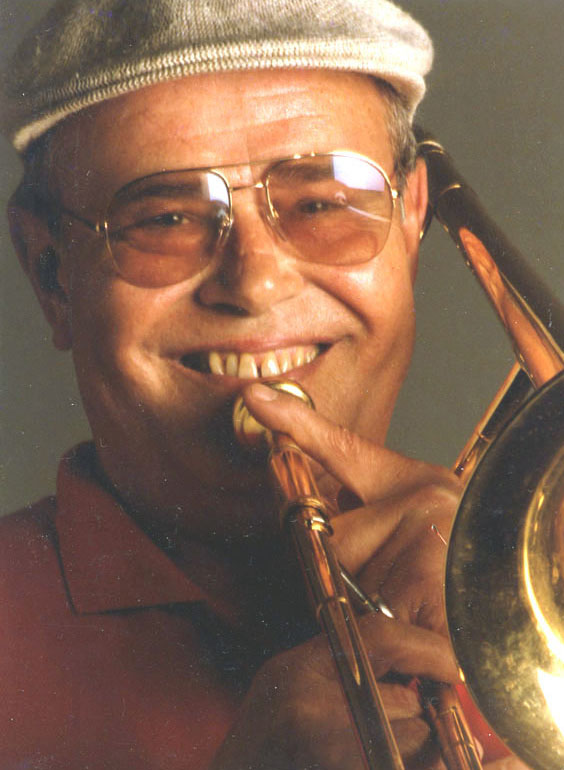
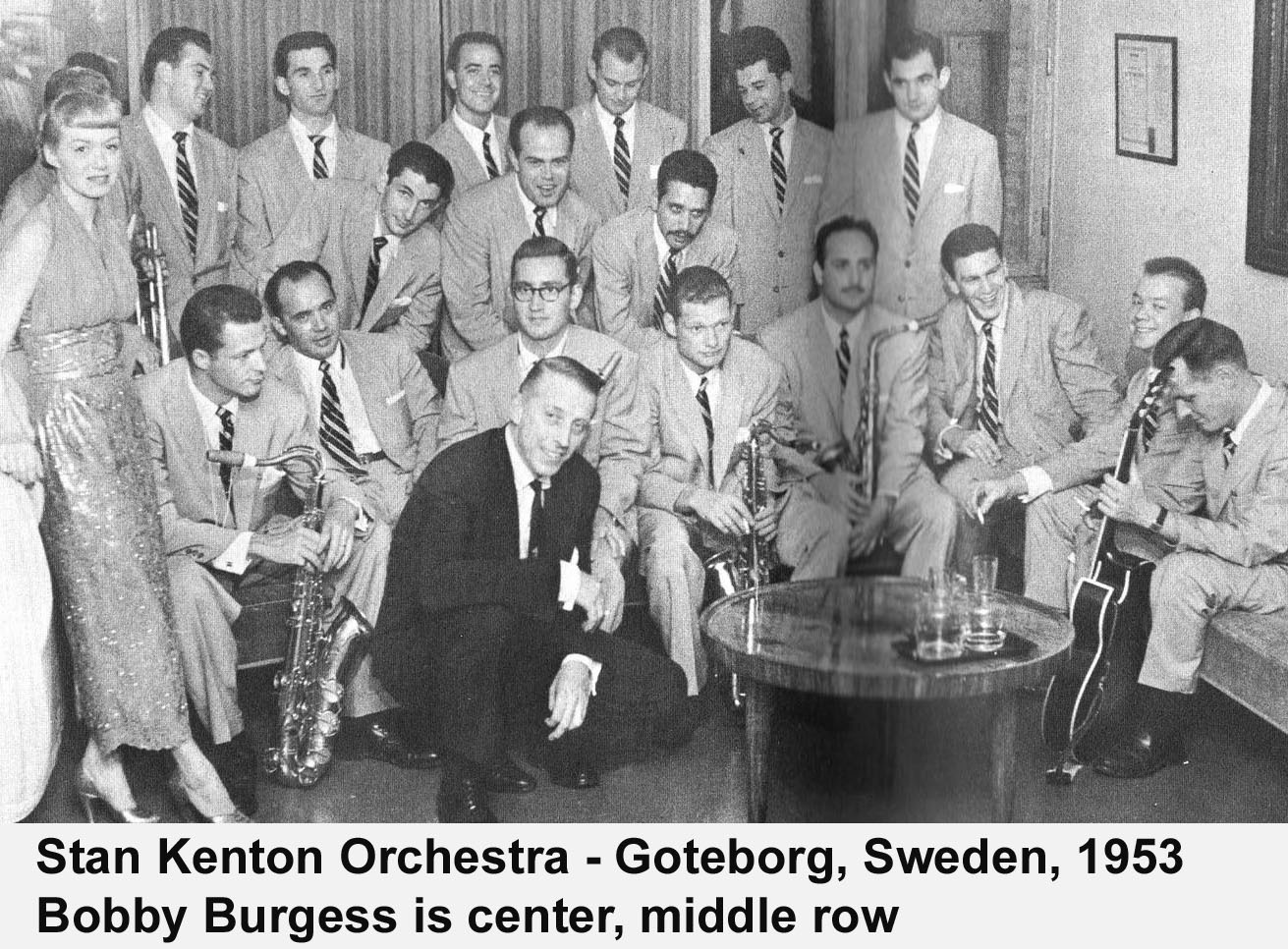
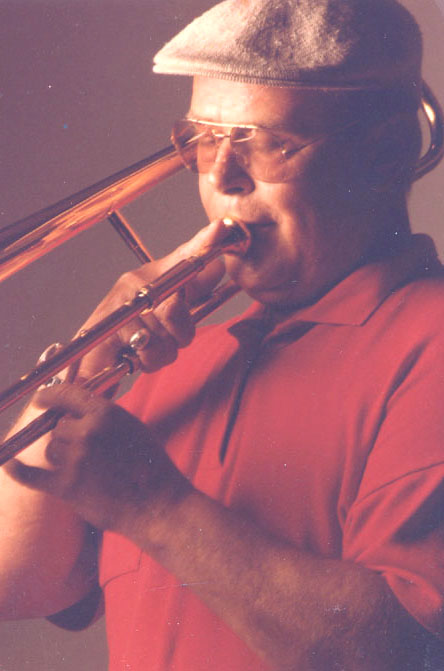 "By the
time I met 'Butter' I had already been greatly influenced by him, by Buddy
Childers, Maynard, Frank Rosolino, Bill Russo and many others - Stan
Kenton, too. I also worked later on with many of them. We were not
allowed to have American musicians in Britain for a long time, so we did
our best by listening to all the records that were issued in the States.
Vic Lewis had a lot of tapes made while the Kenton band was on the road and we
listened to them, sometimes doing so all night.
"By the
time I met 'Butter' I had already been greatly influenced by him, by Buddy
Childers, Maynard, Frank Rosolino, Bill Russo and many others - Stan
Kenton, too. I also worked later on with many of them. We were not
allowed to have American musicians in Britain for a long time, so we did
our best by listening to all the records that were issued in the States.
Vic Lewis had a lot of tapes made while the Kenton band was on the road and we
listened to them, sometimes doing so all night. 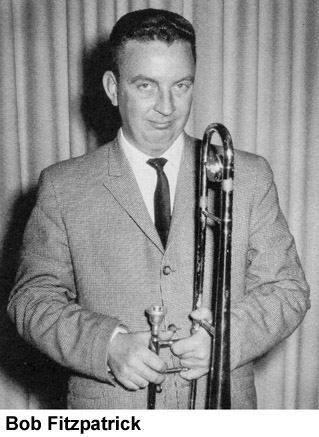 Butter'
and Fitz further defined what has now become known as the famous signature
trombone 'sound'.
Butter'
and Fitz further defined what has now become known as the famous signature
trombone 'sound'.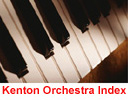
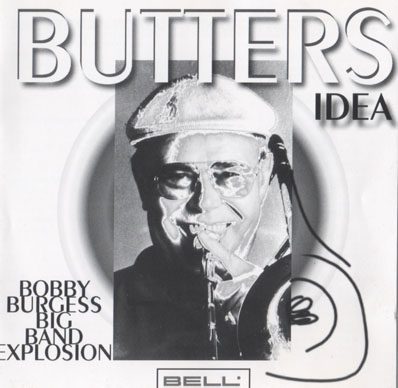 BOBBY
BURGESS BIG BAND EXPLOSION
BOBBY
BURGESS BIG BAND EXPLOSION